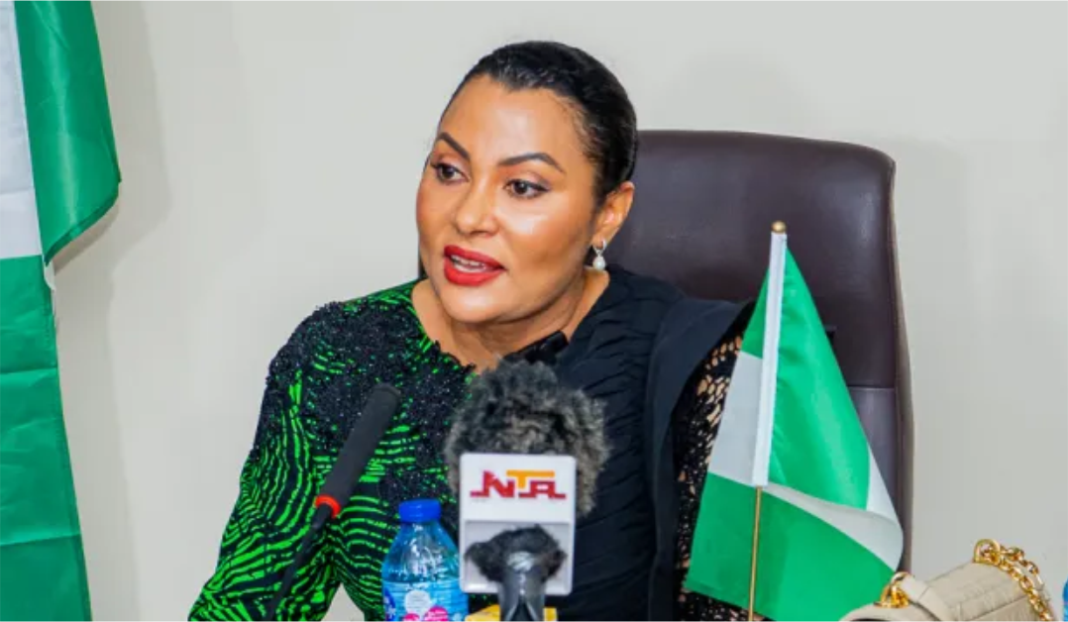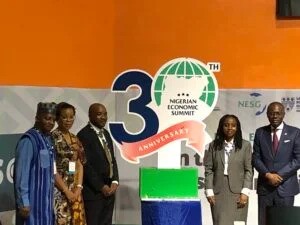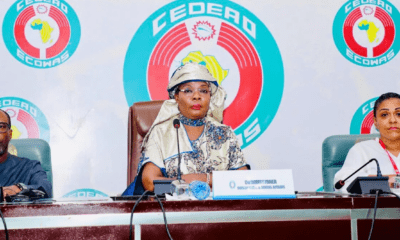News
ECOWAS Court dismisses suit seeking N110m compensation for slain journalists

The ECOWAS Court of Justice on Monday in Abuja dismissed a petition filed by Media Rights Agenda (MRA), an NGO, seeking to compel the Nigerian government to pay N10 million reparation each to the families of 11 deceased journalists.
MRA had in the suit filed in 2021 also sought to compel the Nigerian government to properly investigate the unresolved killing of the journalists between 1998 and 2021, identify, and prosecute their killers.
Delivering judgment, a three-member panel of the Court, presided over by Justice Gberi-be Ouattara, and delivered by Justice Dupe Atoki, held that the 11 journalists could not be equated as “public” with regards to proof of the victims’ status and dismissed the group’s petition.
The Court also held that although the murder of the said 11 journalists was a gross violation of their rights, it was bereft of jurisdiction to entertain and award reparations for the victims.
Earlier during the hearing of the case, MRA’s counsel, Mr Darlington Onyekwere, had argued that States were not only prohibited from taking life outside the permissible circumstances allowed by law but that they also had a positive obligation to act to prevent the loss of life.
The group’s counsel had argued that the MRA’s case was largely predicated on the African Charter, which the Supreme Court of Nigeria had held in Abacha & Ors v. Fawehinmi (2001) 1 CHR 20 to supersede domestic laws.
The human rights lawyer also contended that the Government could not rely on domestic laws to escape liability for the human rights violations complained of in the case.
Onyekwere had contended that the victims had been properly identified and could not have been made parties to the suit, contrary to the repeated arguments of the Government.
The MRA, therefore, prayed the court to direct the Federal Government to pay the families of each of the journalists N10 million as reparation, insisting that in spite of the Nigerian government’s obligations under various domestic, regional, and international instruments.
Onyekwere had argued: “The government has failed, refused, neglected and omitted to effectively investigate, prosecute and punish the killers of the journalists, who were murdered while exercising their fundamental right to freedom of expression and of the press or under circumstances connected to the exercise of these rights.
“Unless the court intervenes, the government will neither adopt measures to protect journalists nor cause any real, transparent, and impartial investigations into the killings of journalists in Nigeria, while the perpetrators of such dastardly acts will not be prosecuted and punished.”
He, therefore, prayed for a declaration, “that the failure of the Federal Government to adopt effective measures to protect and guarantee the safety of the 11 journalists under Article 66(2)(c) of the Revised ECOWAS Treaty, 1993 and Principle 20 of the Declaration of Principles on Freedom of Expression and Access to Information in Africa, amounts to a breach of the obligation imposed on the Government by the ACHPR and the Revised ECOWAS Treaty,” among others.
However, responding, Mr Solomon Ogunlowo, the counsel to the Federal Government/Respondents, and Principal State Counsel in the Federal Ministry of Justice, had urged the Court to decline jurisdiction and hold that MRA’s suit was inadmissible.
Ogunlowo had challenged the competence and admissibility of MRA’s suit and contended that the Court lacked jurisdiction in the matter, stressing that the MRA lacked the locus standi to file and maintain the suit.
MRA, he argued, was not the victim of the human rights allegedly violated and which it was seeking to protect through the suit, adding that no victim had been properly identified and made a party to the suit.
According to him, MRA did not suffer any wrong or injury directly or indirectly on which basis the application could be maintained.
The deceased journalists, over whom MRA filed the suit on August 16, 2021, were: Mr Tunde Oladepo, Bureau Chief of The Guardian newspaper’s Ogun State office, killed in Abeokuta on Feb. 26, 1998 by gunmen who entered his home early in the morning on that day and shot him dead in the presence of his wife and two young children.
Mr Okezie Amauben, publisher of Newsservice magazine was reportedly arbitrarily shot and killed by a police officer in Enugu on Sept. 2, 1998, while Mr Fidelis Ikwuebe, a freelance journalist for The Guardian newspaper, was abducted and murdered on April 18.
Mr Sam Nimfa-Jan, a journalist with Details magazine in Jos, Plateau State, was killed outside the prison in Kafanchan, Kaduna State on May 27, 1999, while covering a communal conflict in Zangon-Kataf.
Nimfa-Jan’s body was found with arrows protruding from his back.
Mr Samson Boyi, a photojournalist with the Adamawa State-owned newspaper, The Scope, was killed by armed men on Nov. 5, 1999 while on assignment to cover a visit by the then state governor, Mr Boni Haruna, to the neighbouring Bauchi State.
Mr Bayo Ohu, then an assistant news editor with The Guardian newspaper, was shot by armed men in his home in Lagos on Sept. 20, 2009.
Mr Nathan Dabak, deputy editor, and Mr Sunday Gyang Bwede, reporter, both with the Light Bearer, a monthly newspaper owned by the Church of Christ in Nigeria, were attacked and killed by a mob in Jos on April 24, 2010, while on a reporting assignment.
Mr Zakariya Isa, a reporter/cameraman with the Nigerian Television Authority (NTA) was killed on Oct. 22, 2011, while Mr Enenche Akogwu, a reporter and camera operator with Channels Television, was killed in Kano on Jan. 20, 2012 by gunmen suspected to be Boko Haram members.
Mr Precious Owolabi, a National Youth Service Corps (NYSC) member carrying out his primary assignment as a reporter with Channels Television, was shot and killed in Abuja on July 22, 2019 while covering a protest by members of the Islamic Movement of Nigeria that had resulted in a confrontation with the Nigerian Police.
NAN also reports that the Court did not award any cost against the petitioners and held that parties in the case should bear the cost of litigation
News
Application deadline for management of Nigeria’s $10bn Diaspora Fund extended


The Nigerian federal government has shifted the application deadline for companies interested in managing the $10 billion Diaspora Fund.
Minister of the Federal Ministry of Industry, Trade and Investment, Doris Uzoka-Anite, disclosed this in a circular on Thursday in Abuja.
Accordingly, the deadline for May 6 has been shifted to May 13, 2024.
The minister urged prospective applicants to utilise the extra time to complete their submissions, ensuring they are thorough and competitive.
She stressed that the extension is designed to allow stakeholders additional time to adequately prepare their applications following the guidelines established for the fund.
“The Federal Ministry of Industry, Trade, and Investment wishes to inform all interested parties that the deadline for the submission of Expressions of Interest (EOI) for the Nigeria Diaspora Fund has been extended.
“The new submission deadline is May 13, 2024. This extension is intended to accommodate stakeholders who require more time to prepare their applications by the guidelines provided for the $10 billion Nigeria Diaspora Fund,” she stated.
News
Sanwo-Olu, NESG harp on PPP for economic growth


Gov. Babajide Sanwo-Olu of Lagos State has emphasised the role of public-private sector partnerships in driving accelerated sustainable economic growth in Nigeria.
He made the remark at the Nigerian Economic Summit Group (NESG) Public Lecture and Founders’ Forum held at the Lagos Business School on Thursday.
The event, which marked the official launch of the 30th anniversary of the Nigerian Economic Summit (NES) has the theme: “In the National Interest: Reflecting on the Past, Reimagining the Future.”
Sanwo-Olu said it was imperative that the public sector improved on its synergy with various actors pursuing a collective agenda of service for the citizens.
The governor highlighted the significant role the NESG plays in bringing together public and private sector leaders in the country in an ongoing dialogue to shape, influence and create a thriving competitive and successful economy.
“We’re not where we should be and we must continue to set goals to inspire ourselves to do better as a nation
“We may not always achieve our targets for our vision timelines, but that should not be an excuse for not trying,” he said.
He commended the NESG for its various interventions such as the flagship annual summit, roundtable and sectorial policy commissions, technical support work and policy innovation centre.
He, however, urged NESG to explore ways of deepening linkage between policy work and public consciousness that allows engagement with the citizenry.
Delivering the lecture, Mrs Ifueko Omoigui-Okauru, Managing Partner, Compliance Professionals PLC, said that while there had been significant economic changes, more needed to be done to ensure accelerated economic growth.
Omoigui-Okauru said that there was need to build inclusive policies that reflect the realities of the nation rather than imposing replicas of other countries.
“In 30 years, we may have made some progress, but we can’t say we have radically transformed Nigeria.
“As we reflect on the NESG, there’s still a lot to be done in bridging the rural-urban divide and have an inclusive agenda.
“We see our journey as work in progress. We need to determine the parameters that would drive our success and put policies in place to move us in the direction where we need to be.
“It is important for us to move away from self interest, think of ways to use technology and other frameworks to collectively achieve the Nigeria of our dreams,” she said.
Earlier in his opening remarks, Mr Niyi Yusuf, Chairman, NESG, said the 30th Summit reaffirmed the essentiality of public-private partnerships in tackling complex economic realities.
Yusuf, however, said that the journey to embracing market mechanisms has not been without its challenges.
He reiterated unwavering commitment in driving reforms through rigorous research, economic and social programmes, and inclusive summits, all aimed at shaping the socio-economic development of our nation.
“Thirty years ago, at a critical juncture in our nation’s history, the NES was born out of a necessity when the winds of economic challenges blew fiercely, necessitating a platform for robust public-private dialogue.
“Since our inaugural summit in 1993, the NES has been a progressive economic discourse rooted deeply in collaborative efforts between government leaders and private sector visionaries.
“Each Summit has crafted policies and strategies essential for removing barriers to competitiveness, growth, and inclusive development.
“Therefore, in commemorating this 30th anniversary, it is essential to assess and discuss the role of this public-private dialogue platform in Nigeria’s socio-economic landscape to provide us insights for future engagements,” he said.
The chairman assured collaborative efforts with the three arms of federal and subnational governments and private sector communities to propel Nigeria towards a more resilient, inclusive and prosperous future.
Dr Pascal Dozie, Chairman, NESG Advisory Board, listed political, economic, education and environment sectors as pathways to reimagining Nigeria’s future
Dozie, also pioneer Chairman of NESG Board of Directors, was represented by Mr Frank Aigbogun, Chief Executive Officer of BusinessDay.
He charged NESG to adopt new strategies in providing collaborative leadership in seeking answers to the following crucial questions.
“How do we strengthen democratic institutions and rule of law, foster culture of inclusiveness and representation?
“How do we promote transparency and accountability in governance and inculcate the culture of consequences for bad behaviour in every sphere of life?
“In economic reimagining, how do we diversify Nigeria’s economy, reduce dependence on oil, foster a business friendly environment and develop the much needed infrastructure base in a coordinated nationwide approach?
“How do we repurpose the educational system to focus on science, technology, engineering and mathematics, encourage technology entrepreneurship and innovation and address unemployment?
“For the environment, how can we develop sustainable agriculture and food security, promote sustainable practices, renewable energy and eco tourism?
“It is imperative that the NESG community leads from the front in not only providing actionable answers to these questions but also making sacrifices to ensure they are implemented,” he said.
Similarly, Chief Executive Officer of NESG, Dr Tayo Aduloju, said that strong institutions, political will, accountability by all stakeholders and the willingness for the government to allow private sector to drive growth were factors needed for a successful economic development.
“The challenge for us today is how to drive the country forward over the next 30 years in a way that is not just growth but growth that creates jobs and opportunities for everyone and no one is left behind.
“We are dealing with a country that is going through macro-economic volatility and instability.
“So, the lessons here at the forum are deep reflections of what should change in our approach, a stronger priority on execution, a deeper commitment on accountability of government systems to deliver and how economic barometers impact the ordinary man on the street.
“Our resilience to hold government accountable, to keep insisting that there must be an economy that works for all Nigerians, rule of law, an environment in which free enterprise is practiced, is what we must continue to fight for,” he added.
News
NCS FoU Zone ‘B’ Nabs Fake Customs Officer


-
capital market2 years ago
Rt.briscoe, FBNH, Others halts negative performance of stock market
-
Finance3 months ago
Court orders Sen. Victor Umeh to repay N136m bank debt to AMCON
-



 Abuja Update2 months ago
Abuja Update2 months agoUNDP, FG partnership needed to achieve inclusion, equity- Minister
-
Abuja Update1 month ago
Banks drive stock market performance with N147bn gain
-



 Business1 week ago
Business1 week agoTingo Group unveils Tingo Electric, Tingo Cola drink at Lagos launch
-



 Health2 weeks ago
Health2 weeks agoCapacity training will reduce migration of health workers- NPHCDA
-
News4 months ago
Oil thieves sponsoring malicious media campaign against Navy – Spokesman
-



 Infotech1 month ago
Infotech1 month agoWorld Backup Day: NITDA urges Nigerians to ensure backup of data













